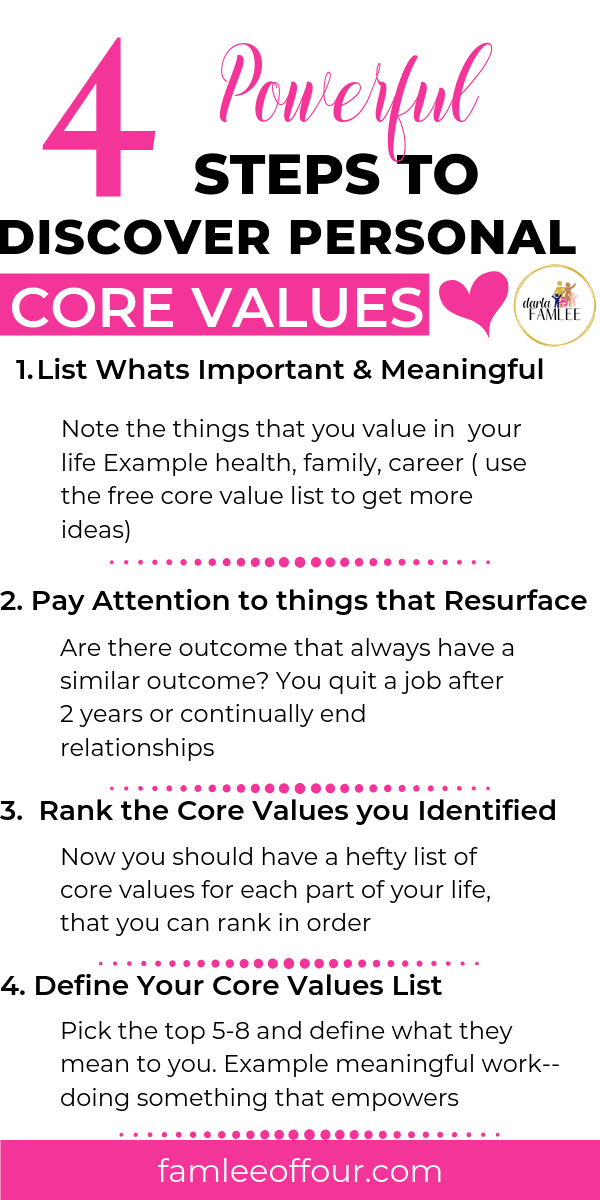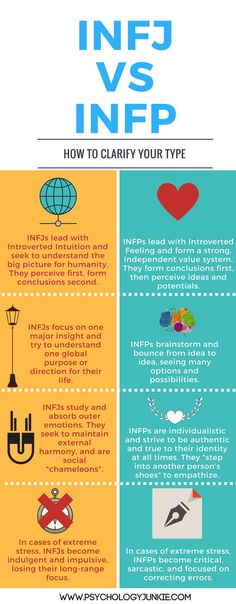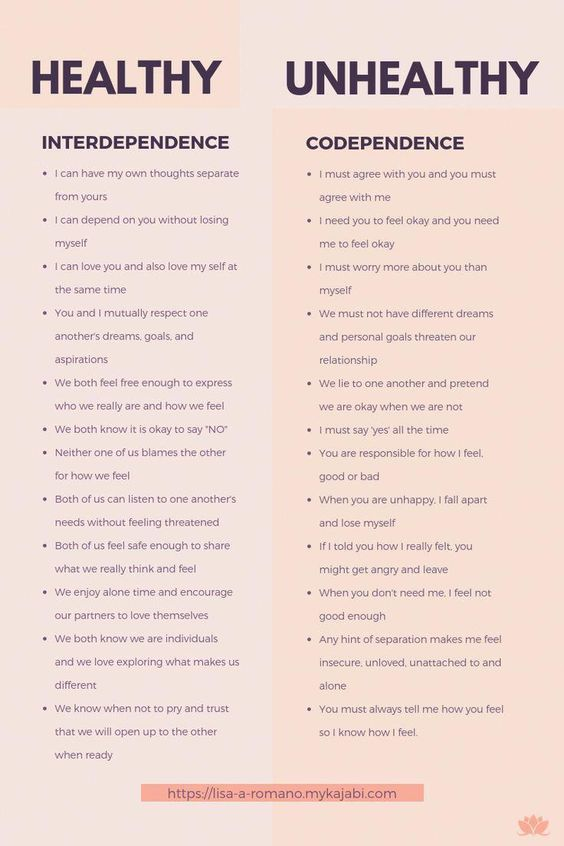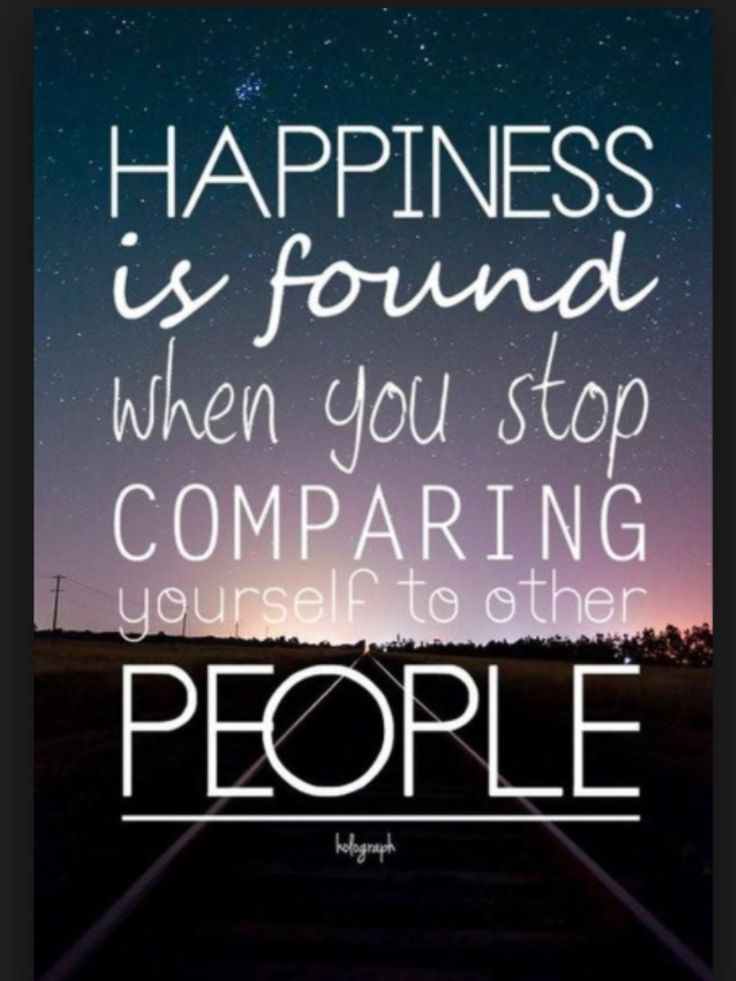Finding your core values
6 Ways to Discover and Choose Your Core Values
“What Should I Do?” Everyday Values Dilemmas
You’ve planned to have dinner with your friend on Friday night. On Friday morning, the guy you’ve been crushing on asks you out for the evening. Do you say yes and break the date with your friend?
You just got a raise. Should you bank it for retirement or make your life more comfortable now?
You wanted to get a head start on an important report for work later this evening. But your child has had a tough day and could benefit from your attention. Should you prioritize work or family?
Life presents an endless series of decisions, large and small, that require you to make difficult choices. While many factors are involved, the critical factor in deciding may be your core values. These values tell you what kind of person you are, or want to be, and provide guidelines, or even imperatives, for your actions.
But how do you know what your core values are? This blog post will reveal six ways to discover and choose your core values.
Values: A Definition
First, what is a “value” anyway?
Values “are the principles that give our lives meaning and allow us to persevere through adversity,” according to psychologist Barb Markway and Celia Ampel in The Self-Confidence Workbook. I love both parts of this definition—that values stand for our most meaningful ideals and also that they inspire us to keep going when the going gets tough.
You’ve probably learned many of your values from your parents, your teachers, your religious leaders, and the society around you. You’ve also probably rebelled against some of those values at times or changed your mind as you’ve learned more about yourself and your world. But it can be helpful to decide—or re-decide—the top six to eight values that mean the most to you right now and to have a shorthand label for those principles. That’s where the information below comes in.
Choosing Core Values
If you are not sure about your own core values, or if you would like to clarify which of your values are top priority now, here are six options.
1. Choose your top six to eight values from a wide-ranging list of values.
To do this, you need a good list.
Dr. Russ Harris, the author of numerous books about Acceptance and Commitment Therapy (ACT), has provided such a list in his book, The Confidence Gap. You could also use a similar list from The Confidence Workbook or just use the mini-list that follows, making good use of the “other” option at the end of the list:
Financial Security; Compassion; Health/Fitness; Nature; Accomplishment; Creativity; Dependability; Loyalty; Beauty; Bravery; Gratitude; Love; Connection/Relationships; Learning; Leadership; Survival; Self-Preservation; Security; Adventure; Family; Work; Success; Calm; Freedom; Other___; Other ___.
Now use one of these lists to select your top six to eight values. Yes, you can change your mind. In fact, it's natural to modify some of the values on this list as you face new and challenging situations.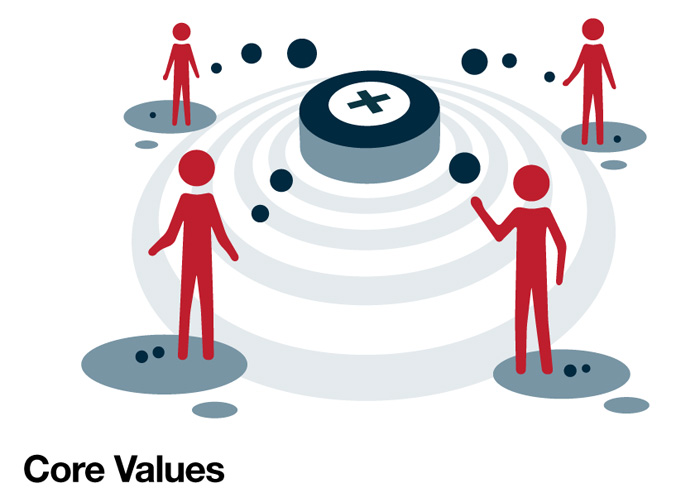 However, other values represent enduring ideals that you would only change under duress.
However, other values represent enduring ideals that you would only change under duress.
I did this activity recently using the Harris list, despite thinking beforehand that I already knew my values pretty well. It turned out to be enormously useful to put specific labels on my vague ideas of my core values. Among other things, I learned I put a high value on many of the “C” values, such as "compassion," "creativity," and "connection." Sometimes when I make a choice, I now say to myself, “Hmm. You decided to write a new blog instead of going out for coffee. That was creativity winning out over connection.”
Note that sometimes your choice is not between right and wrong but between two cherished values, as in my situation above.
2. Think of three to six people you most admire or love. Consider why they are so important to you.
Values can be personified in people that you love and admire. You can use this simple two-step process to uncover the values that you associate with your significant others and role models:
Step 1: Identify and write down six people who are important role models or valued connections for you.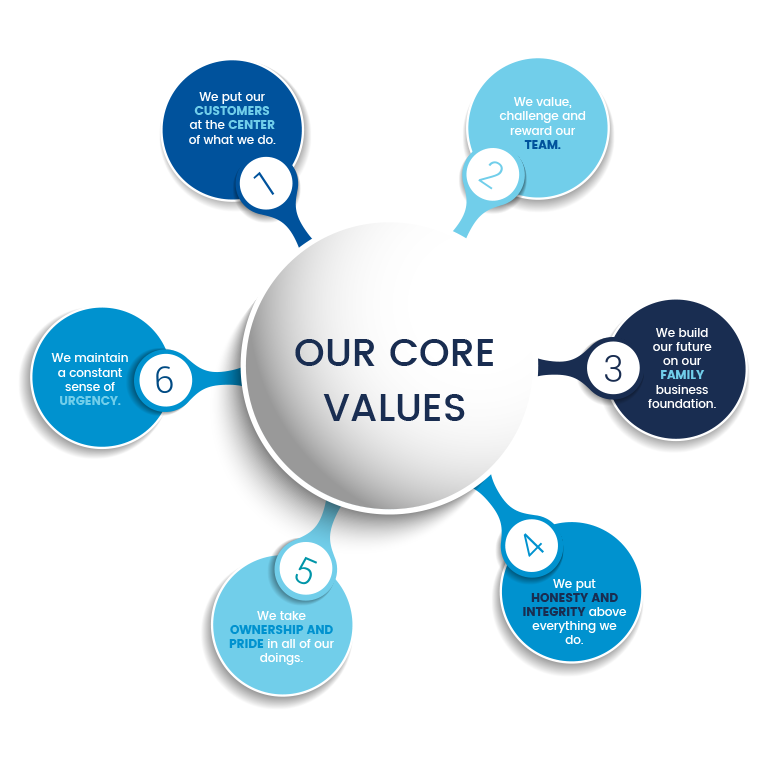 Step 2: Think of the values they embody. For example, your list might include: “my grandfather for his acceptance and love,” “my wife for her honesty,” “my colleague for his listening skills,” and “my friend for his loyalty,” to name a few.
Step 2: Think of the values they embody. For example, your list might include: “my grandfather for his acceptance and love,” “my wife for her honesty,” “my colleague for his listening skills,” and “my friend for his loyalty,” to name a few.
Dr. Steven Hayes, the founder of Acceptance and Commitment Therapy, suggests that you uncover your values by naming your heroes. For example, why do you admire, say, Martin Luther King, Jr.? Is it because he fought for social justice? Is it his commitment to non-violence? His kindness to others? Identifying the specific values embodied by your heroes can inspire you to adopt those values for yourself.
3. See a career counselor.
Your values are a major determinant of career choice, work decisions, and career transitions. For example, you may value “financial security,” “helping,” or “being my own boss (autonomy).” Each of those values might lead you down a different career path. That’s why career counselors have a large toolbox of strategies and inventories (self-report tests with no right answers) including values inventories to help match their clients to a compatible career area.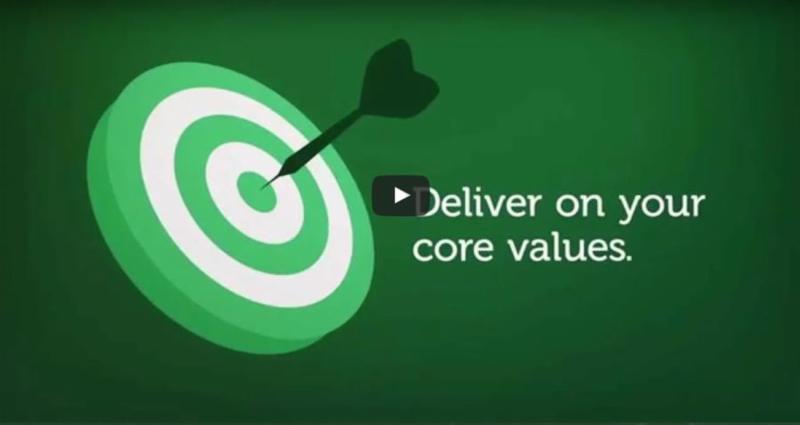
4. Use an online values inventory.
You can find various values inventories online. One free online values inventory is located here. The authors, R. Kelly Crace and Duane Brown, are experts in wellness and career development. Although I’ve never worked with this particular inventory before, I agree with the authors’ idea that clarifying your values can “serve as a blueprint for effective decision-making and optimal functioning.” (The inventory looks so intriguing that I intend to take it myself—it's actually on my list.) By the way, if you are concerned about confidentiality (and I hope you are), the website states that the information you supply will be used for ongoing research, but your name will not be linked to your data.
5. Observe yourself and learn.
As you live your life, be mindful of the choices you make. For several days, consciously put a label on the values behind your key decisions at work and at home. Pay particular attention to whether the values you chose above are reflected in your daily life.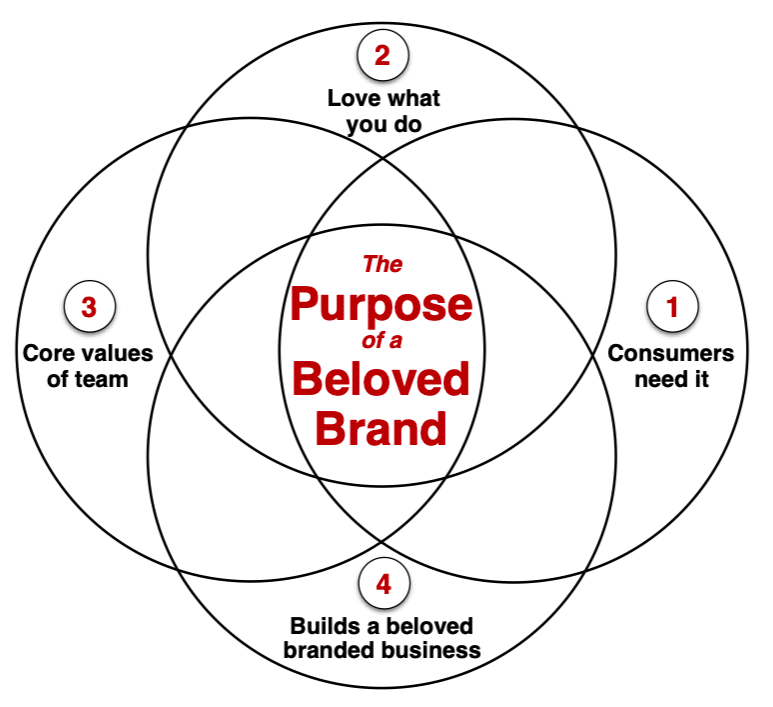 If not, what values are you expressing or living by as you go through your day? Are there patterns? What can you learn about what you want, what you are willing to give up, and what is non-negotiable in your life? If you experience a lot of dissatisfaction with your choices, you may not be living up to your values or you may need to re-evaluate what is most important to you.
If not, what values are you expressing or living by as you go through your day? Are there patterns? What can you learn about what you want, what you are willing to give up, and what is non-negotiable in your life? If you experience a lot of dissatisfaction with your choices, you may not be living up to your values or you may need to re-evaluate what is most important to you.
6. Focus on the bitter and the sweet in your life.
Dr. Hayes suggests that you learn about your values by thinking back to both the sweetest and most painful moments of your life. These moments could direct you to what you care about most. For instance, what were the peak experiences that might reveal key values? If you won an award for teaching, consider that "leadership" or "motivating others" might be significant values. What were the most painful experiences? If you know the pain of being excluded by others, you might realize that "compassion" is one of your primary values.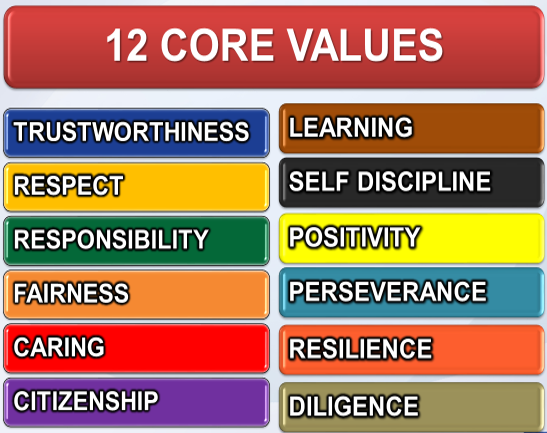
Difficult Choices and Difficult People
As mentioned above, there are times when two cherished values will be in conflict. Knowing why you are choosing Value 1 instead of Value 2 can be helpful in resolving any inner conflict you may feel. And certain values may rise to the top in particular situations. For example, during an emergency, “survival” may become the value that guides your actions. Values will also shift over time as you fulfill your various goals—for example, once you achieve a comfortable degree of "financial security," that value may recede into the background and other values may take its place.
Sometimes you’ll have to defend against difficult people—such as psychopaths, extreme narcissists, and master manipulators—who seem to be guided by negative values. With such people, it can be a challenge to stick to the positive values highlighted in this blog. Then there are the people who pay lip service to “core values” and “family values,” but whose choices betray their words as just empty rhetoric.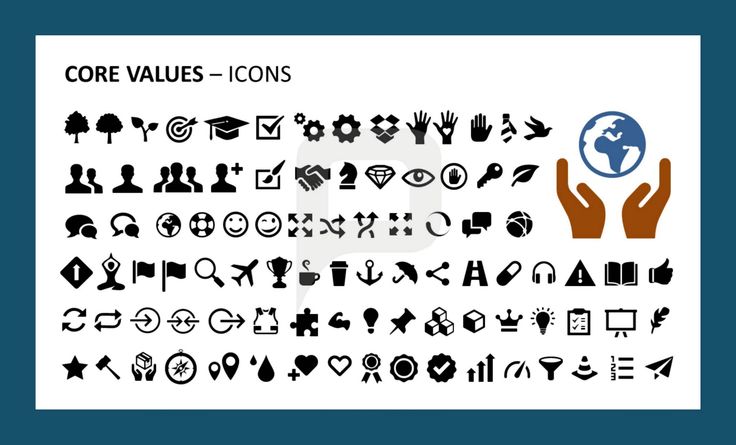
Observing yourself and being honest about what you see might keep the phrase “core values” from becoming a cliché. You can’t be perfect and you’ll often need to compromise, but you can aim for the integrity that a values-driven life can provide. As Dr. Harris sums it up in The Confidence Gap: “True success is living by your values.”
Know Your Values, Know Yourself
“Values” is one of six key elements to knowing who you are, as I explain in this blog. The others are interests, temperament, biorhythms, life goals, and strengths. But of all these, knowing your values is the royal road to self-knowledge because values choices both reveal and build character as you act on them. Your values are even more important than your goals, as Dr. Harris points out, because you might not reach your goals, but you can almost always choose to live by your values.
A Preview of Coming Attractions
This blog has focused chiefly on identifying your values so that you can make better life decisions. But there's much, much more. Although it's hard to believe, knowing your core values can help you reduce stress, communicate with more compassion, increase your self-confidence, and power up your willpower. The next blog will reveal the research behind those benefits and how you can utilize it for yourself.
But there's much, much more. Although it's hard to believe, knowing your core values can help you reduce stress, communicate with more compassion, increase your self-confidence, and power up your willpower. The next blog will reveal the research behind those benefits and how you can utilize it for yourself.
Meanwhile, experiment with living the "values-driven life." Does living by your values increase your sense of satisfaction with yourself and your life?
© Meg Selig, 2018. All rights reserved. For permissions, click here.
Personal Values Assessment | Discover Your Values
What are personal values?
To know your values, you first need to understand what they are. We have prepared a series of simple but very developing exercises that will make it much easier for you.
Values can be simply described as things that are especially important to us. For example: family, health, security, freedom, trust. You can say they are the theme of our lives.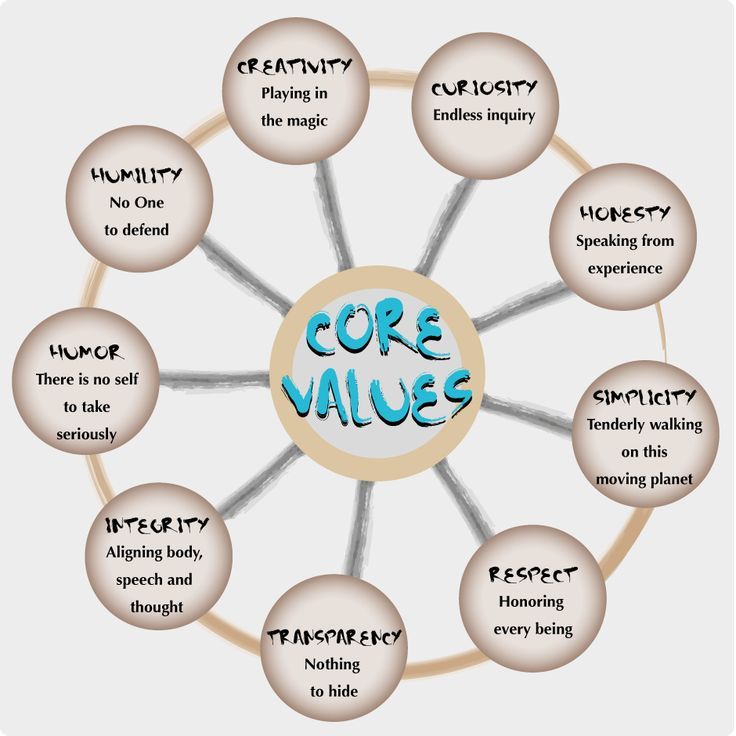 They are always present with us, although we do not always have to be aware of them. They led you to where you are today. They shaped you as a human being and determine how you are perceived by others.
They are always present with us, although we do not always have to be aware of them. They led you to where you are today. They shaped you as a human being and determine how you are perceived by others.
For example, a health-conscious person will feel great importance of their diet and exercise. Thanks to their systematic efforts, they enjoy vitality and are perceived by others as a specimen of health.
We can also interpret values as goals that we want to achieve in a long term. They can slowly change over time because they depend on our current stage of life. Different values are attractive to young people just entering adulthood. Different for people developing their careers and starting their own families. And completely different for people who have raised children and are finishing their professional careers.
For people who see the greatest value in family, starting their own family and taking care of their well-being will be a goal they will focus their attention and actions on.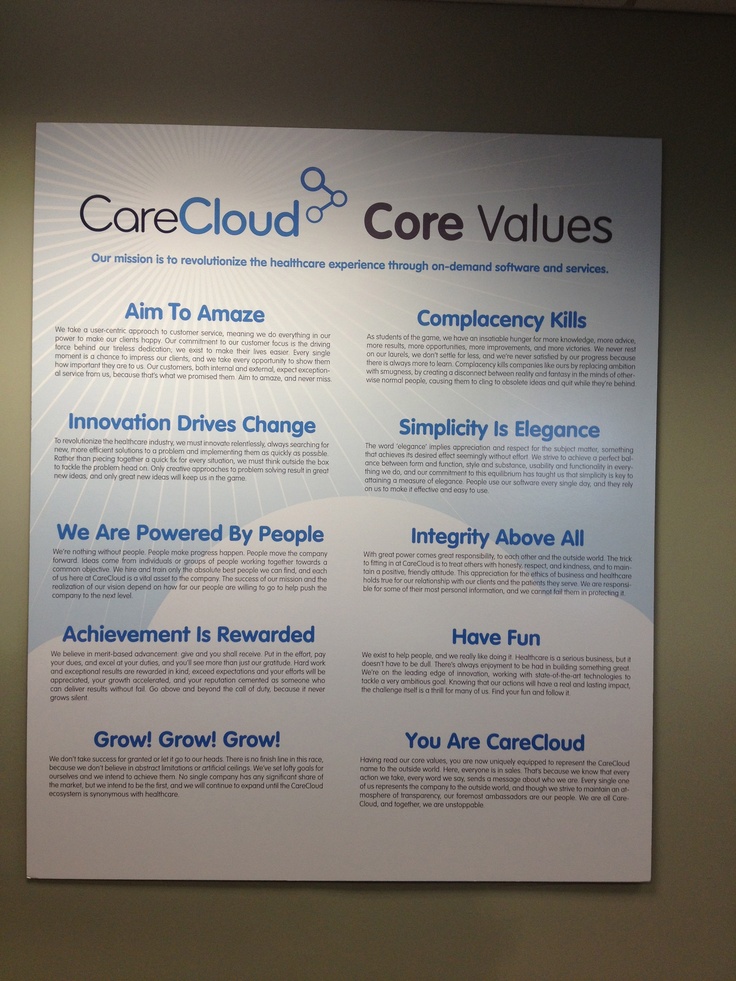 Expect them to spend more time with their family than others. They try to satisfy all needs and solve encountered problems, and when making decisions, they are guided by the interests of their loved ones.
Expect them to spend more time with their family than others. They try to satisfy all needs and solve encountered problems, and when making decisions, they are guided by the interests of their loved ones.
It can therefore be concluded that values are a strong motivation for us to act. We naturally strive to live as much in harmony with our values as possible. The reward for these efforts is a sense of inner consistency, satisfaction and contentment with your life.
From the definitions above, we can also conclude that values are like a signpost that tells us which way to go to get where we want. Our independent decisions will always be, to some degree, geared towards the realization of our values. This is why it is so important to trust your choices, and not follow the opinions of the environment.
So the question is - did you choose your values yourself?
The answer does not always seem obvious, as this choice was not usually the result of one conscious decision. Your values were determined by the whole baggage of experience you have gathered along the way.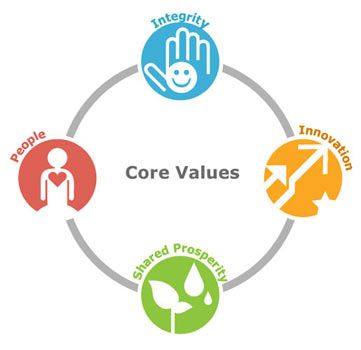 All the events and situations that helped you discover what’s important to you.
All the events and situations that helped you discover what’s important to you.
There are also single moments that can completely remodel our hierarchy of values.
Imagine a situation in which someone finds out that they are terminally ill and do not have much time left. How valuable will health and time spent with loved ones be then? How much will professional success and money be worth?
Values are a very individual matter. Even if two people declare that their most important value is success, each of them may ascribe a different meaning to it and implement this value in their own way.
Now that you have an idea of what values are, let's think about the benefits of knowing your own values.
How does knowing your own values help you make decisions?
When you have a decision to make, it's worth asking yourself - how does the choice match with your values?
If it has a positive effect on the realization of your values, then you already have a clear answer.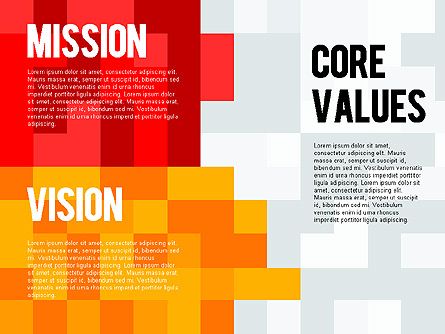 You will feel comfortable with your decision because you will stay true to your values. Thanks to this, you will avoid dissonance between your actions and what is really important to you.
You will feel comfortable with your decision because you will stay true to your values. Thanks to this, you will avoid dissonance between your actions and what is really important to you.
It is important to rely on your own values when making important decisions. Not the general values, but your own. Remember that ultimately you will take responsibility for your choices and you will live with its consequences.
Values are very important even when making small, everyday decisions and choices. For example, what foods we choose when shopping. How we spend our free time. What do we spend our money on.
These seemingly insignificant choices accumulate and after several months or years of systematic repetition, they are no longer meaningless. Their consequences become visible to us and affect us.
For example, the habit of exercising daily will improve our figure and increase our physical fitness. A prudent approach to finances will allow us to save money to achieve the desired goal.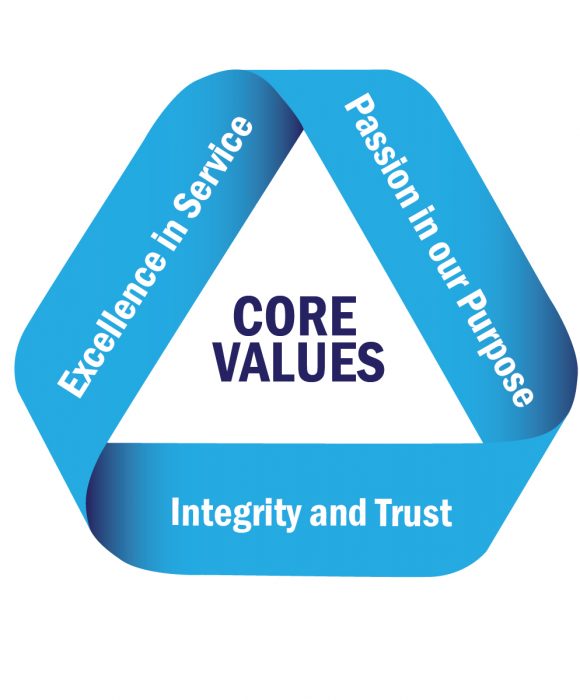 The habit of reading daily will broaden our knowledge and horizons.
The habit of reading daily will broaden our knowledge and horizons.
It sounds very simple, but we all know it is not. Life daily verifies our values and commitment to their implementation. Sometimes we devote ourselves to what is easy and convenient at the moment, but in moments of self-reflection, we feel guilty. Guilty for not realizing our potential for wasting time.
If we remain aware of our values, we’ll increase our chances of making choices that are favorable to us. A personal list of values can be a compass for us, which in moments of doubt will remind us in which direction we want to go.
How to live in harmony with your values?
If you want to live up to your values, you need to remember them. It seems obvious, but many people don’t pay enough attention to it. Just preparing a list of personal values is barely the beginning. Real change comes in small everyday steps.
Try to remember the five most important values. You can write them down on a small piece of paper that you’ll keep in a visible place on your desk.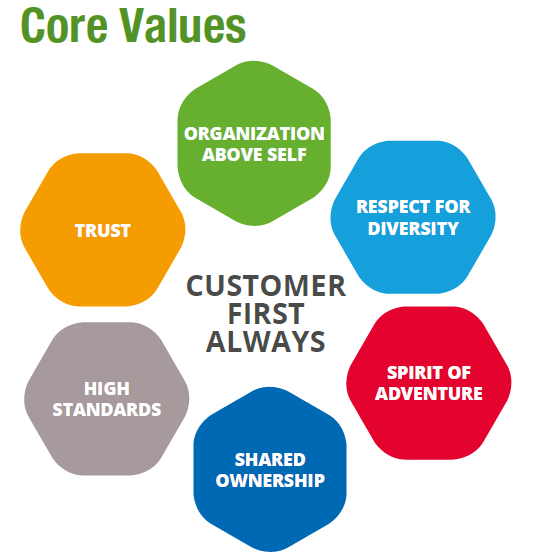 If you need more privacy, you can download or prepare a list in the form of a wallpaper for your phone.
If you need more privacy, you can download or prepare a list in the form of a wallpaper for your phone.
The point is that in the first days after compiling the list, you should be as close as possible to the values you choose. Make reading your list one of the first things you do in the morning and the last thing you do before falling asleep.
When you know your values by heart, you can remember in which direction you want to go at any moment. Use this knowledge as often as possible. For almost every daily activity and choice. Thanks to this, you will avoid the wrong paths or going around in circles.
The point is, you should be able to precisely define your "why".
Frequently ask yourself why you made this decision and not the other one. Or why you are currently doing this activity. This way, you will often verify to what extent your actions are in line with your values. Remember to always be honest with yourself. It lets you get to know and understand your motives.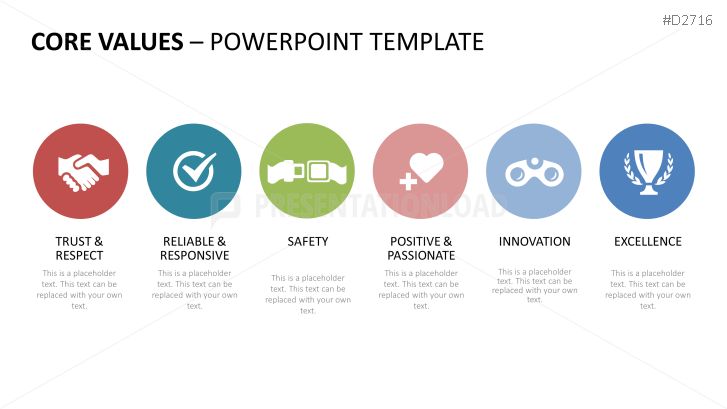
For example: why do you go to work every day?
- To be able to support your family,
- To have financial stability,
- To achieve professional success in the future,
- To help others.
Does your answer match your values? How satisfied do you feel with the current situation?
If you feel inconsistent with your own values in certain areas, it's time to think about what changes you can make. You don't have to change everything at once. It is enough to make small changes regularly.
Take your time and think about the areas of your life where you feel deficient. Think about how they are related to your values. Look particularly at:
- family,
- relations with others,
- health,
- intellectual and spiritual development,
- professional career,
- free time.
List specific problems that hinder the implementation of the most important values. Anything that prevents you from realizing your full potential.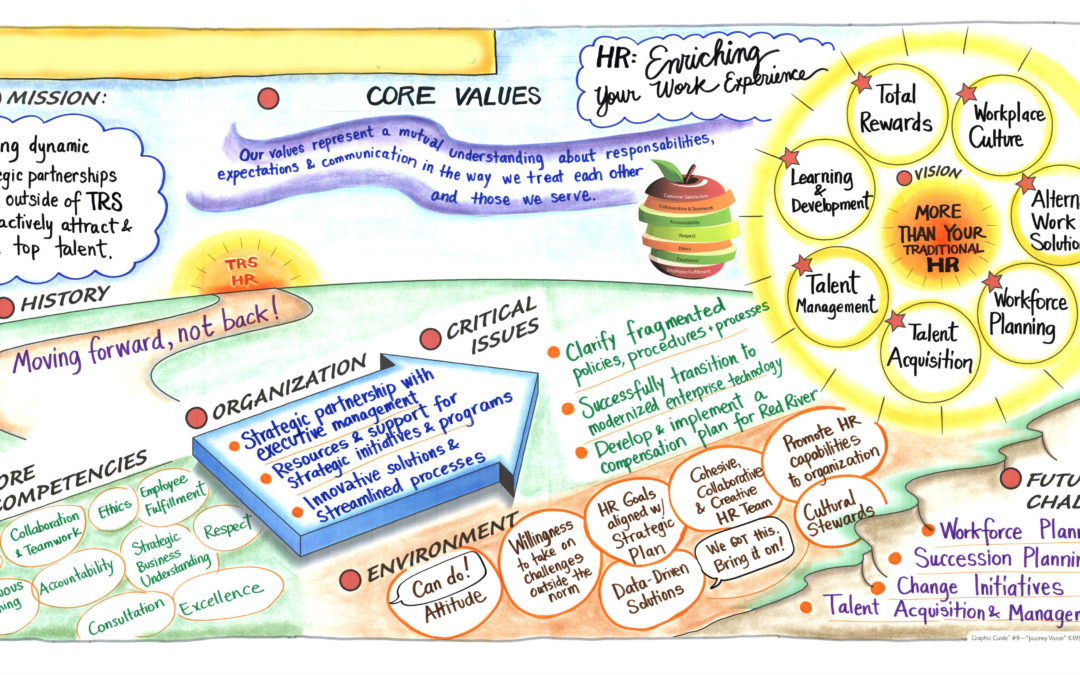 It is important to know what exactly you want to change
It is important to know what exactly you want to change
Now go through the list of problems and think about how you can reduce them. Think about what small step you can take now to increase your consistency with the declared values. What can you do in the next week or month? Write down your ideas to read them later.
Do you feel like you’re not paying enough attention to your family? Planning a trip together once a week will be a small step forward.
After implementing a few ideas, it's time to verify their effects. What did you feel while implementing them? Do you think this is the right direction?
If your feelings are positive, you can set the next steps for implementing changes. Take your time and watch your reactions carefully. It is a constant search for small improvements and self-improvement. With each iteration, you increase your consistency with your own values. Think of it as a trip. Observe the changes and enjoy the growing satisfaction in your own life.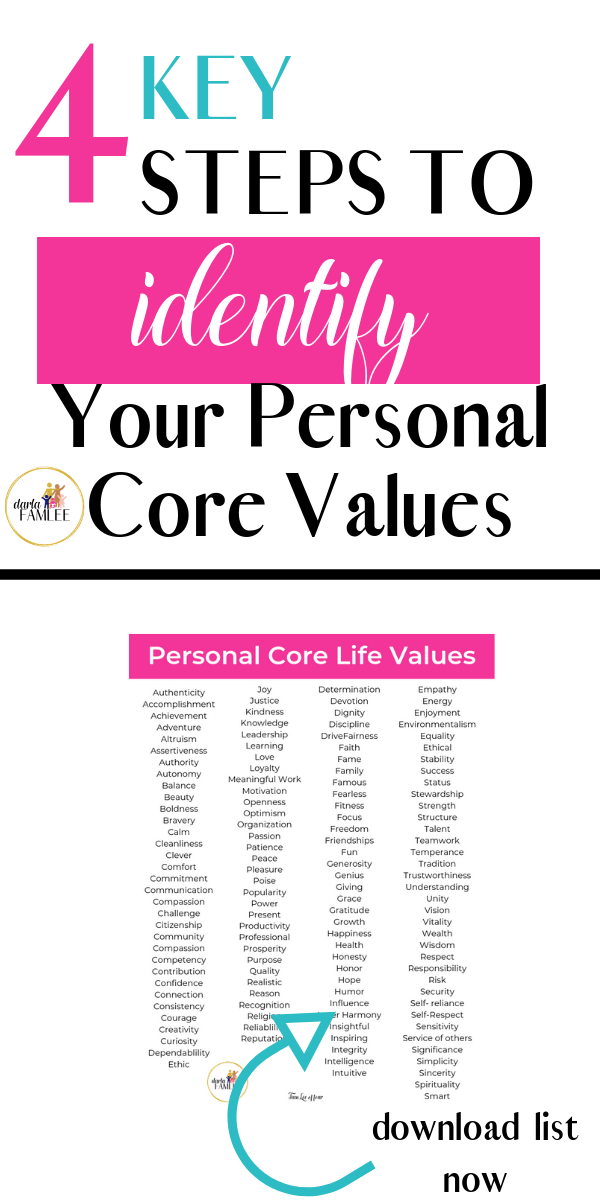
How to discover your values?
Defining your own values is not as easy as it seems. First, you need to understand what they are and prepare a complete list of values from which you will be able to select the most important ones for yourself.
Where to get the full list of values? There are many lists on the Internet, but they are often incomplete or too long. You need a list that allows you to find all the values and is not a random set of synonyms. We recommend that you use the list we have prepared.
Once we have a prepared list of all values, we can filter it according to our needs and preferences. Look at each value in turn. Discard all values that arouse negative feelings in you and those that are indifferent. Leave only those that you consider important and that you identify with.
At this point, you have a list of your values, but it's not over yet. You can probably see that not all of them are equally important to you. Now let's focus on finding the most important ones.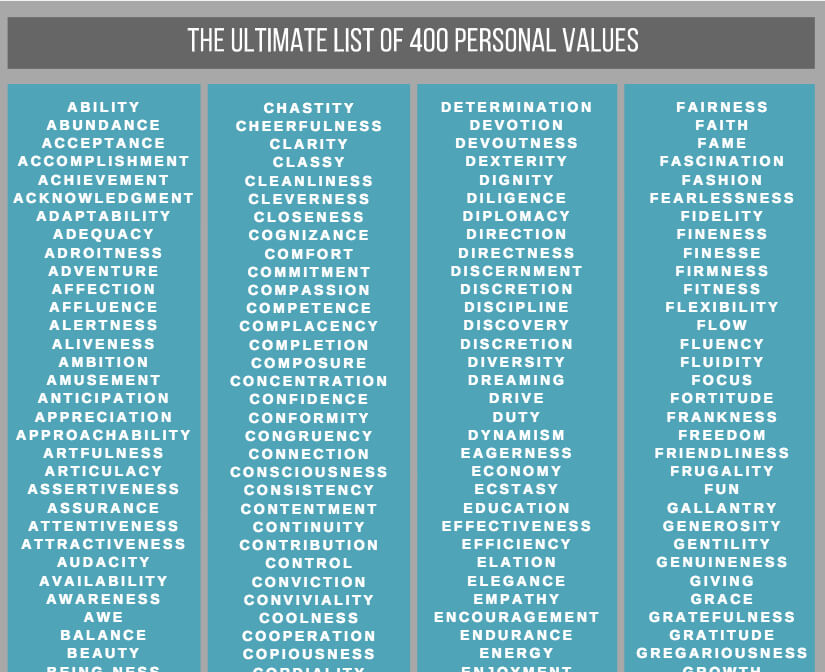 This can be done by directly comparing the values and sorting their positions on the list. This is the most difficult stage, so take your time. Take as much time as you need to do it.
This can be done by directly comparing the values and sorting their positions on the list. This is the most difficult stage, so take your time. Take as much time as you need to do it.
While comparing values:
- think which one is more important to you and why?
- imagine situations in which both values being compared must compete with each other.
- decide which value you would be willing to sacrifice for the other.
If you have gone through the entire process and you are satisfied with the established hierarchy of values, you can already tell what is most important to you. Pay particular attention to the first five values on the list.
It is worth repeating the entire exercise regularly. Preferably once every six months. Thanks to this, you can see how our needs and motivations change over time. It is also a good time to verify to what extent we implement our values.
If you are ready to discover your personal values, we encourage you to take our free test.
How can personalvalu.es help you start living in harmony with your values?
From the beginning of personalvalu.es, our goal was to create a simple and effective method to find and organize personal values. The developed solution turned out to be so good that today it is used by personal trainers, during classes with students, and even in recruitment processes.
The compiled list of 62 personal values is the result of the analysis of many different approaches to the value definition. When creating it, we paid special attention to cover the space of personal values as accurately as possible while maintaining clarity and ease of interpretation.
All values are well described and provide guidance on strengths and potential threats.
The test we have developed will help you to:
- find the values that are closest to you,
- prioritize your values.
To help you remember your values, we have prepared:
- an email with a link to your test result,
- a quiz supporting the memorizing process,
- phone wallpaper with a list of your values.
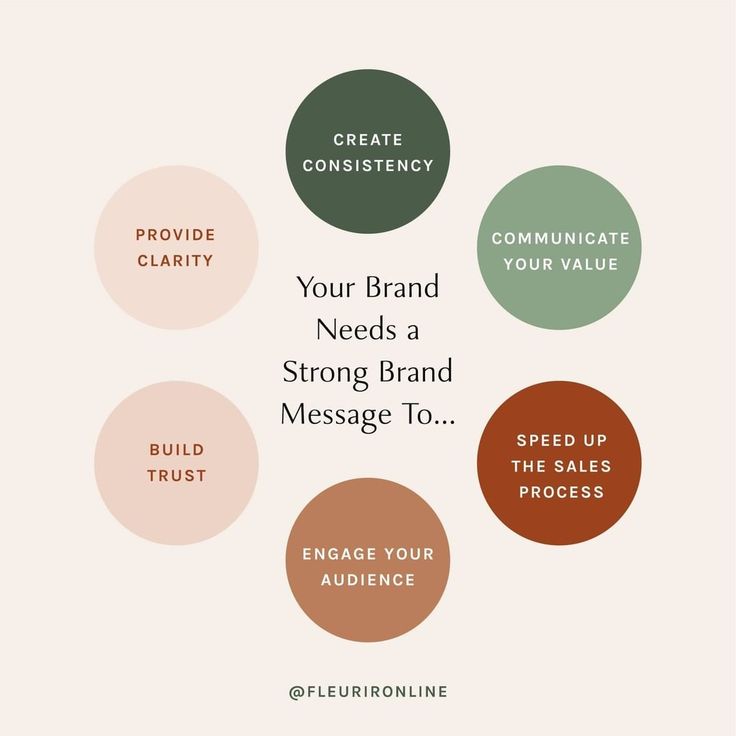
We are constantly working on expanding the possibilities of personalvalu.es because we believe in our mission. For a long time, we have been putting more and more emphasis on the development of the educational character of the project. Our goal is to provide you with the best materials and tools you need to raise awareness of your personal values.
How to define your values - Change will be!
In this article, we'll talk about how to define your values and why it's important to know what's important to you. In the last article, we checked whether you are dreaming of your dream. If you haven't checked yet, start over by reading and doing the tasks from this article.
WHAT IS VALUES
Every person has values, but not every person realizes that he has them and that they are important. Why two people facing the same task or problem will choose a different solution. Why, if two people are offered the same job with attractive conditions and salary, one person will agree and the other will refuse? With equal initial data, it is they who influence the decision - our values.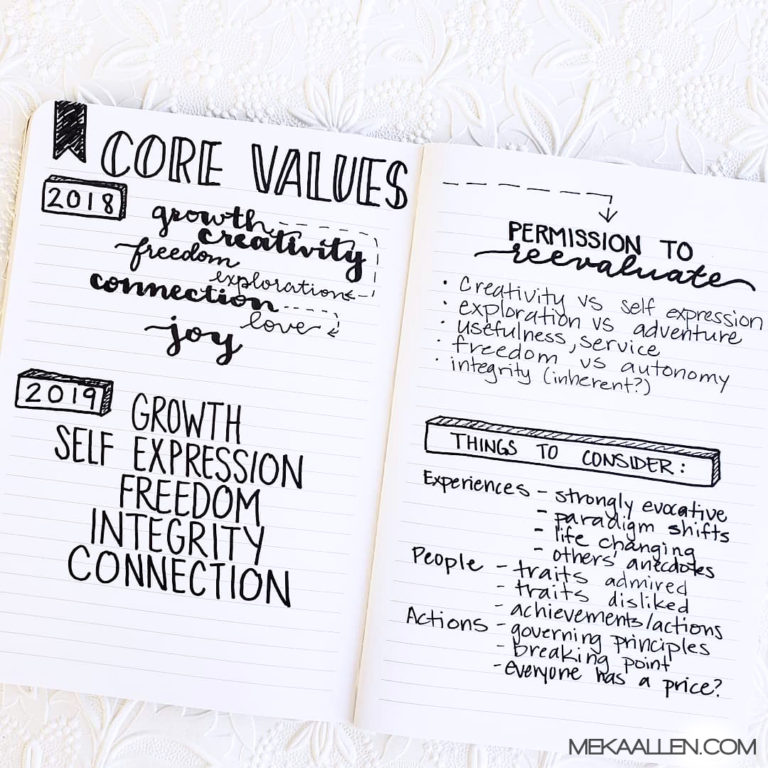 It is possible that status and financial well-being are important for the person who accepted the offer, and he is ready to pay for this with processing or a long journey to the office. For another person, his family may be more important, so he does not consider options in which he will have little time to communicate with his loved ones. Hope this example encourages you to define your values.
It is possible that status and financial well-being are important for the person who accepted the offer, and he is ready to pay for this with processing or a long journey to the office. For another person, his family may be more important, so he does not consider options in which he will have little time to communicate with his loved ones. Hope this example encourages you to define your values.
Values are what fill our lives with meaning, help us make decisions and answer internal questions “why?”. Living in harmony with them, we feel harmony and satisfaction. Without knowing your values, you can make decisions that conflict with them and cause feelings of discomfort and dissatisfaction. You know that boring feeling that something is wrong? Here, this is our indicator, saying that somewhere we turned in the wrong direction.
Knowing what is important to us can make our decision-making process easier by not initially considering options that do not suit our internal installations, and also feel a sense of satisfaction from what is happening in life.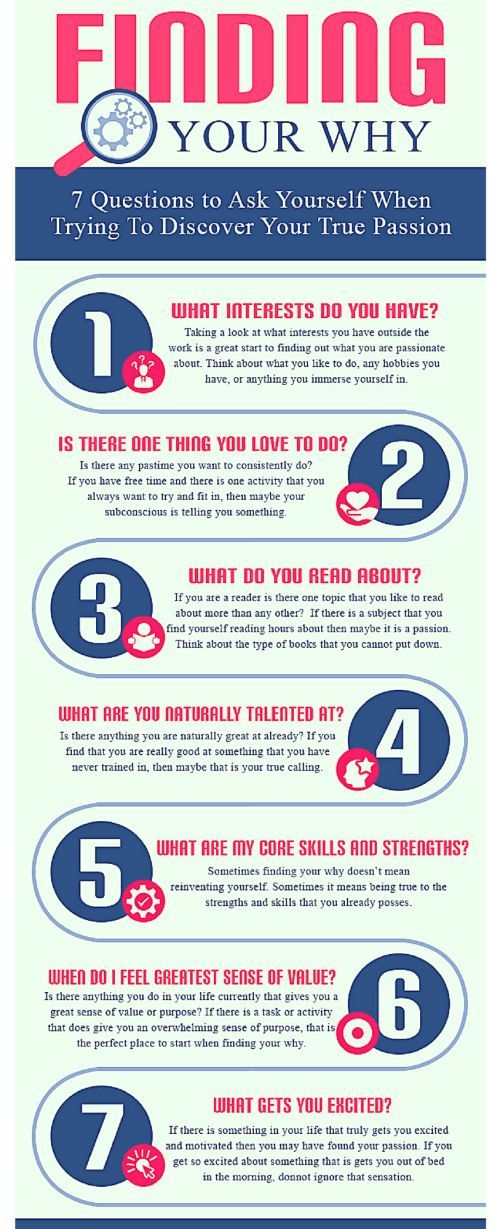
WHAT ARE THE VALUES
There are about 200 types of values in different classifications. I will write about the main ones. But remember that the list below is not a complete list, you may well add something of your own to it.
So, the main values:
— Family, relationships, children
— Comfort, home, financial stability - these are the values \u200b\u200bof an orderly and comfortable life, peace of mind.
- Your own business, hobby - is the realization of oneself through a business that brings joy (not necessarily what you do for a living, but this business brings you joy and its own personal meaning).
- Career, power, status - this is social status, position in society, the ability to influence processes, etc.
- Education, advanced training
— Personal growth, self-development — this includes self-knowledge, attention to oneself, search for harmony, search for one's “I”.
— Beauty, health — appearance, physical data, grace, taking care of your body, conscious nutrition, etc. , desire to help others, volunteering.
— Communication is a social value, friends, colleagues.
I want to draw your attention to the fact that love is not a value, but a feeling. Money itself is not a value either, the value is what lies behind it. For example, power, social status, a sense of financial security.
HOW TO IDENTIFY YOUR VALUES
Now I'm going to give you some exercises to help you figure out what matters to you.
-
Rank the list of values.
Take the list of valuables above. Add, if necessary, values that are not on the list, but that come to mind. After - rank the resulting list on a scale from 1 to 10. At the same time, 1 is not at all important for me, 10 is very important for me. Don't try to rate according to accepted norms, put your honest mark.
-
Write a wish list.
Write 15-20 wishes you would like to fulfill in a table format with the following columns:
- name of desire;
- when it appeared;
- what is connected with;
- how important it is to perform (from 1 to 10).
Sample table below.
Return to reading the article after completing the task.
After - match each list item with values. You can use the list above from the article and/or add your own. See if your top values on your wishlist match up with the ones you prioritized in exercise 1. I'm sure some of them do.
-
Match both lists.
Now take a closer look at the values on your two lists that didn't overlap as a result of these two exercises. Consider if they are really important. Try to remember situations in which you acted in accordance with them. How did you feel making the decision in their favor?
How did you feel making the decision in their favor?
As a result of these two exercises, you will have your personal list of values. It may change over time, this is normal. What you wrote today is necessary for you to fill your life with harmony and meaning.
Analyze whether you live your life in harmony with the resulting list or not. Ignored values create a feeling of discontent and discomfort in life. Think about how you can make a difference. Add activities that are important to you to your daily routine.
P.S. If you need help identifying your values, book a consultation with me on and together we'll define your list.
P.P.S . In the next article we will talk about motivation. About how to determine your internal motivation, which will help you not to quit what you started. Subscribe to receive newsletters about new articles and my little secret stories.
How to define your values and why it is important
Can you name your top 5 values? Without speculating, choosing what is really important to you, and not what society considers it to be.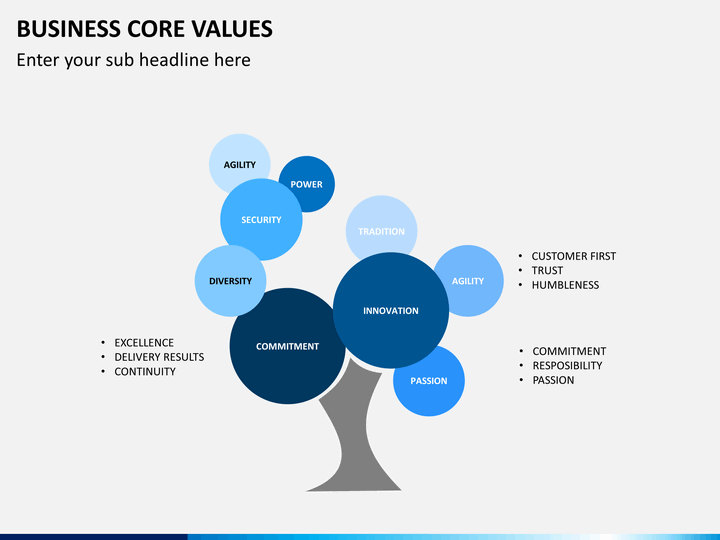 Most likely, a few minutes will not be enough for this. At the same time, realizing and accepting your values, you can radically change your life.
Most likely, a few minutes will not be enough for this. At the same time, realizing and accepting your values, you can radically change your life.
Why do we need to know our values
We can accept it or not, but everyone has values. And life will be much easier if we are aware of them and will be guided when we make plans or make decisions.
Values determine our priorities and help us understand when life takes a wrong turn. If actions and behavior are consistent with values, we are satisfied and happy. When everything is wrong, chances are something goes against the things that are important to us.
Will a person who prefers cooperation and support, but works in a highly competitive environment, be happy? If my values are slow life, simplicity and minimalism, and the pictures on Instagram have parties, brands and a complex face, will I be satisfied? If your values are family and relationships, and you work 12-hour days a week, how long can you last?
You need to know your priorities in order to choose the right education, work, partner, hobby, direction in life.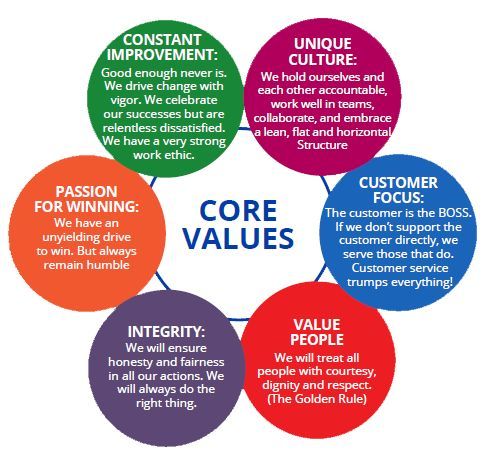 In order not to focus on the values that are imposed by society, stereotypes and social networks. So that in 10 years, having become professionals or having accumulated tons of property, not to realize that all this time we have been living someone else's life.
In order not to focus on the values that are imposed by society, stereotypes and social networks. So that in 10 years, having become professionals or having accumulated tons of property, not to realize that all this time we have been living someone else's life.
How to define your values
Core values change throughout life. At the beginning of a career, they will be determined by money and status, but over time, family and the balance between work and leisure can outweigh. Therefore, values must be constantly reviewed, especially in difficult moments when a way out of the crisis needs to be found.
To determine your values, try to thoughtfully answer the following questions:
- When was I absolutely happy?
- When did I feel overwhelmed with pride?
- What were the 2-3 most important achievements in my life?
- When did I feel unhappy? Because of which? What did I miss?
- When was I completely satisfied with the state of affairs?
- Were there other people around me at these moments? Who was that? What they were doing?
In the answers you will find what is important to you and what is missing.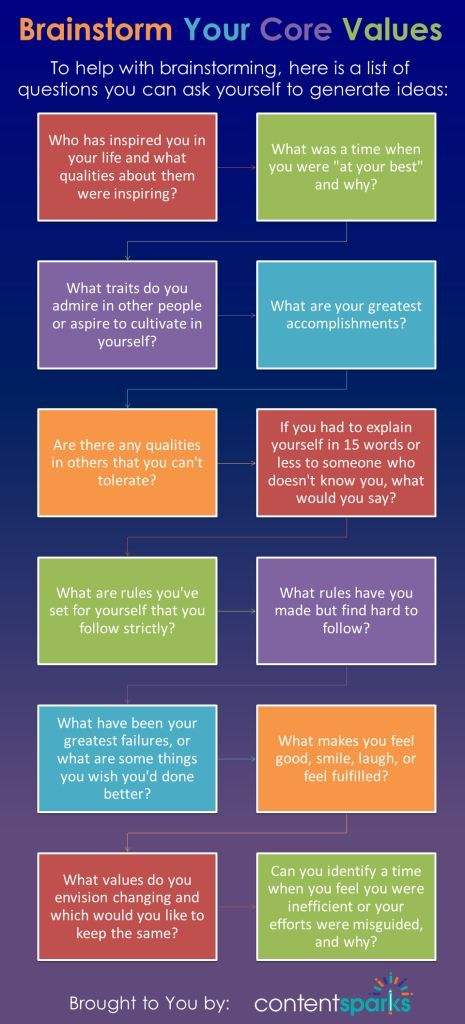 Make a complete list of values. Take your time, it can take from several days to several weeks.
Make a complete list of values. Take your time, it can take from several days to several weeks.
Highlight fundamental, core and additional values. Like me, you might want to define your imaginary values—those that seem important but actually hold us back.
Fundamental values
If we consider the categories of values as a house, then the fundamental ones are the foundation, that on which everything rests. A bad foundation means the house may collapse. If something goes wrong, you can return to these values to find out the reason and fix it.
To identify fundamental values, take your list, look at the first two items, and ask yourself: if you had to choose one of the two, what would it be? Work through all the points in this way until there are 3-5 most important things in your life left. I got it like this:
- Relationships
- Health
- Creativity
- Self-development
Core values
Core values are walls, roof, windows. Without them, a house would not be a home. These are our principles. Ideally, we should understand what these things mean to us, because people perceive the same concepts in different ways.
Without them, a house would not be a home. These are our principles. Ideally, we should understand what these things mean to us, because people perceive the same concepts in different ways.
- CARING FOR YOURSELF. On all planes, there is a clear instruction: put on an oxygen mask yourself before helping someone else. When there is not enough energy, but we continue to share it with others, we use up a resource that is not there and borrow from ourselves from the future. To share energy, it must be enough. To do this, you need to take care of yourself and replenish the supply.
- FREEDOM. It's often hard to believe, but the world won't collapse if you retire from social media and don't bother with stats and marketing, say no, let go of toxic relationships, defend psychological boundaries, express feelings that others may not like, break other people's patterns, not to do it just because it is customary, not to achieve career heights, not to follow traditions, not to build an empire, not to be efficient, productive and motivated, not to depend and not make anyone dependent on oneself, make mistakes, choose.
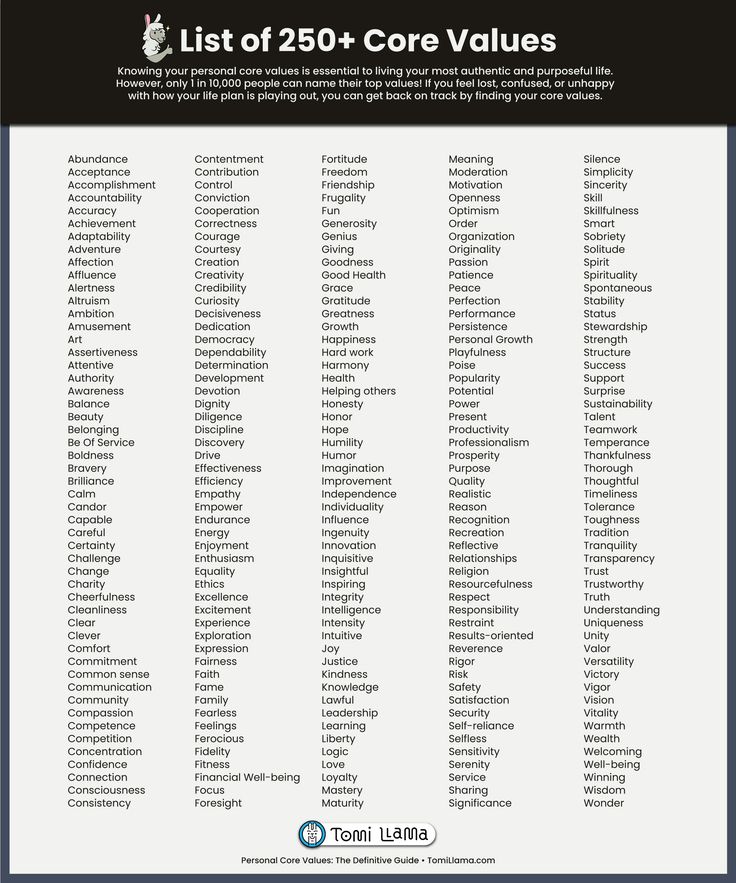
- COMMUNICATION. Communicate at the level of feelings. Listen to hear, not to respond. Build respect for other points of view and go beyond your own beliefs. Exclude any communication based on projections, passive aggression and manipulation.
- STABILITY. In order to conquer the world every day, you need to understand that there are indestructible things. I don’t adapt well and don’t like change, but I often create conditions in which I have to change or change something in order not to get stuck. At the same time, it is important for me to understand that there are unshakable things that will always be. The comfort zone is what you need to create before leaving it.
- THANK YOU. Happiness is not about constantly wanting more, happiness is about learning to notice and appreciate what you already have.
- PERSONAL BORDERS. I have nothing to hide, but I don't need to show everything either. People have the right to their opinion, I have the right not to know it.

- QUALITY. By working on the quality of each individual area, thing or value, improve the quality of life.
- PRIVATE. A quiet evening at home instead of a noisy party, a walk in nature instead of discovering the next trendy place, a favorite hobby instead of a video, a book instead of Instagram, small towns instead of megacities, eco-friendly local brands instead of a mass market, the sound of rain instead of music, wildflowers instead of a million scarlet roses.
- HAPPINESS. This is not something huge that constantly flickers somewhere far away, but something small that is already here. It's not about a degree or a well-paid job, it's not about being like others. This is about hope, discoveries, about how to listen to your heart, no matter what it chooses, about how to be kinder to yourself. It is to understand that happiness is not about others, happiness is always about me.
- SENSE. If life is a road, then the meaning of life is one of the turns, and happiness is one of the ways to travel.
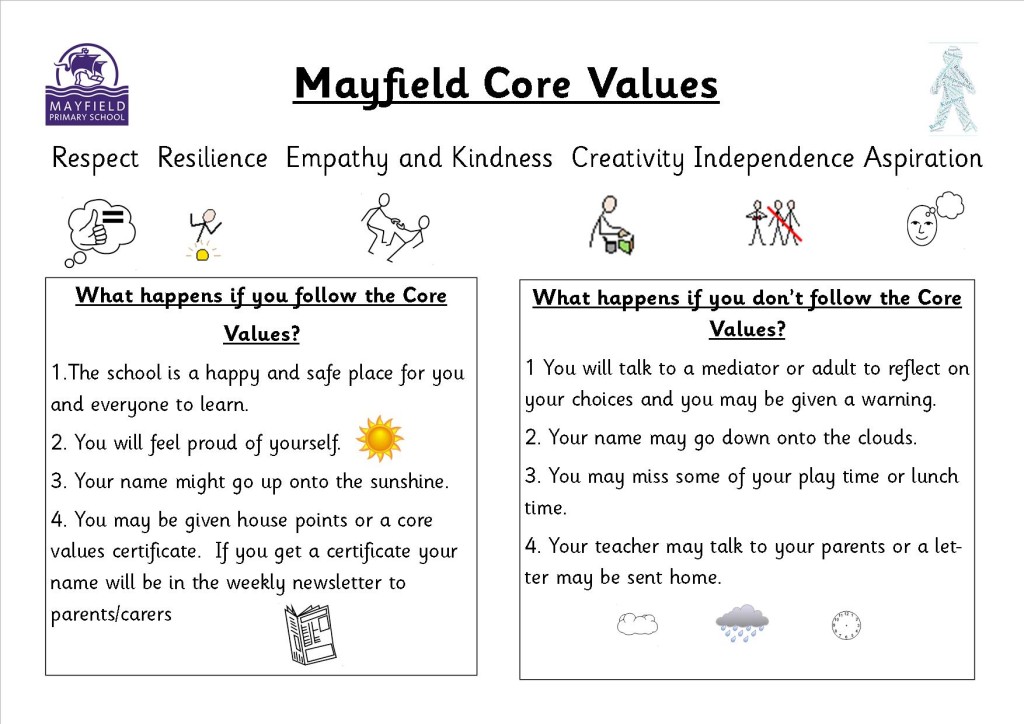
- AWARENESS. The ability to track your emotions and thoughts from moment to moment is the key to understanding yourself, to living in peace with yourself, to the thoughtful management of thoughts, emotions and behavior. It is constantly focusing on your feelings, comparing your behavior with internal standards and values.
- LIFE IN THE MOMENT. Happiness comes when you stop waiting and embrace the best of the moment.
Additional values
If the fundamental values are the foundation of the house, and the main ones are the walls and roof, then the additional values are furniture and decor. You can live without them, but it is much more convenient and interesting with them. These are tools, entertainment, hobbies, style, knowledge.
- Work
- photo
- blog
- therapy
- new knowledge
- humor
- comfort
- minimalism
- order
- beauty
- travel
- new experience
- slow life
- aesthetics.
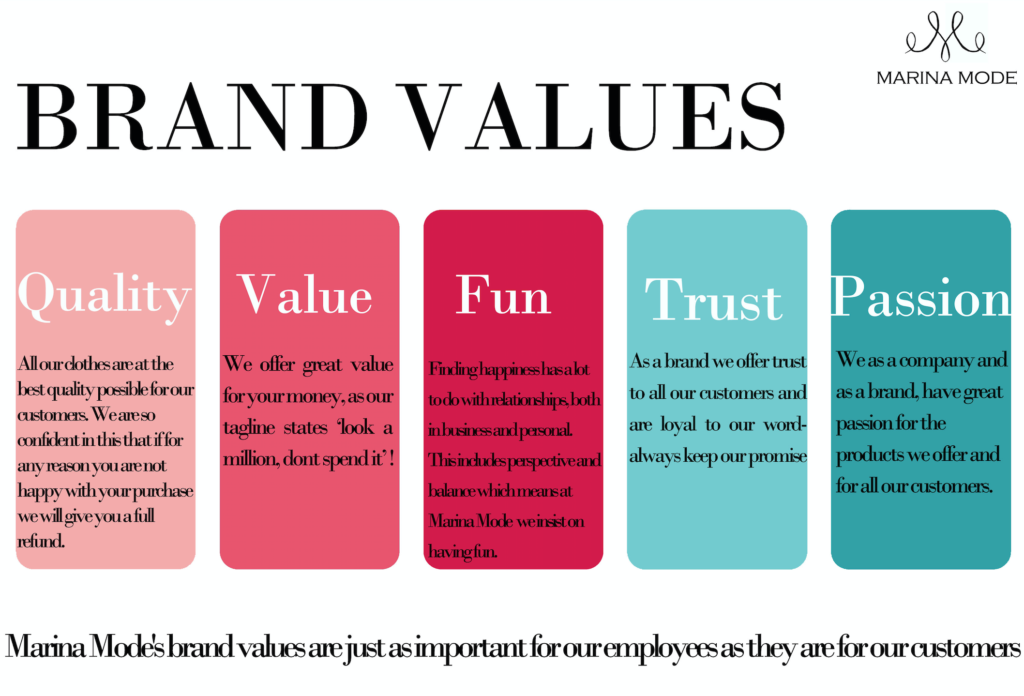
Imaginary values
Imaginary values are superfluous things in the house. They get under your feet, catch your eye, interfere with prioritization and distract from what is important. We think that without them it is impossible, but it is not so.
Social networks, news, efficiency, productivity, control, planning, lists, motivation, will, recognition - all these things that seemed so important, in reality, only created the illusion of importance and made me waste time and energy. When I stopped multitasking, made my Instagram profile work for me, not against me, realized that it means enough, stopped making plans to conquer the world and making lists of 20 points that I still didn’t complete, I understood what harmony means and balance between family, work and play.
Question your values
Review your list of values again to make sure they align with your life and vision of yourself. Are you satisfied with this list? Are you proud of your fundamental values? Could you share it with your friends?
Do the things you support represent your values, even if your choice is not so popular and not approved by the majority?
Making decisions based on values is not always easy.